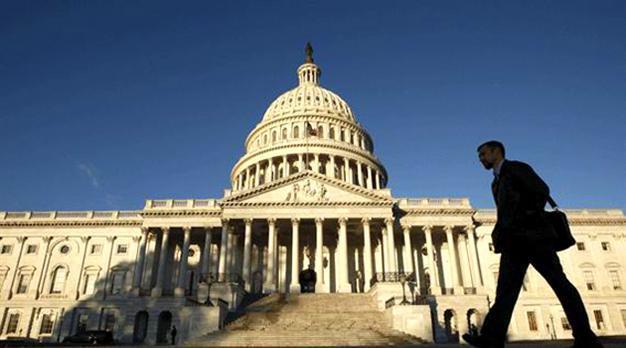US House bars arms deal with Russian firm over Syria support
WASHINGTON - The Associated Press

Hürriyet photo
The House lashed out at
Russia for its unwavering support for Syria, voting yesterday to stop the
Pentagon from doing business with a Russian company that has armed Bashar al-Assad’s regime.
The overwhelming vote on an amendment to the defense spending bill came just hours after Russia vetoed a U.N. resolution threatening nonmilitary sanctions against Syria. The United Nations and other Western nations have been pressuring Assad to end the deadly crackdown on his people that has dragged on for 16 months.
The House later passed the defense spending bill for the fiscal year beginning Oct. 1. The White House has threatened to veto the legislation, criticizing the House for reneging on the spending levels that Obama and congressional Republicans agreed to last August in a deficit-cutting budget.
The vote was 326-90.
Incensed by the unending bloodshed in Syria, the House backed an amendment by Rep. Jim Moran, R-Va., that would bar the Pentagon from contracts, cooperative agreements and loans with Rosoboronexport, a Russian state-controlled arms export company that is providing weapons to the Syrian government. The vote was 407-5.
The Defense Department has bought 33 dual-use Mi-17 helicopters for the Afghan military from the company, including an order for 10 aircraft last week. The no-bid contract for aircraft and spare parts is worth $640 million.
The Pentagon has relied on the company because of the Afghans familiarity with Russian-made helicopters. But Russia reportedly sold $1 billion in arms to Syria last year and the Assad government bought 36 combat jets from the state-controlled firm.
"I should think it’s troubling to all of us that we are purchasing helicopters from a Russian firm that is directly complicit in the deaths of thousands of innocent Syrian men, women and children," Moran said.
"This has got to stop."
In a surprise vote, the House agreed to freeze defense spending at the current levels, cutting $1.1 billion from the $608 billion bill. An unusual coalition of liberal Democrats and tea party Republicans jo pleaded for some fiscal discipline from their colleagues.
"Austerity to me means spending less," said Republican South Carolina Rep. Mick Mulvaney. "Total government spending will be up this year. We’re still facing a $1 trillion deficit. We need to do better to get our spending under control."
Defense Department base budgets have nearly doubled in the last decade, and that doesn’t include the hundreds of billions of dollars spent on the wars in Iraq and Afghanistan.
Mulvaney was joined by Democratic Rep. Barney Frank of Massachusetts, who questioned the need for half a trillion on defense.
The military "has three ways to destroy a Soviet Union that doesn’t exist anymore," Frank said.
The vote was 247-167, with 89 Republicans joining 158 Democrats.
Overall, the bill would provide $518 billion for the Pentagon and another $88.5 billion for the war in Afghanistan, $2 billion more than Obama requested. The Senate still must craft its version of the bill.
Democrats challenged the House bill’s spending levels, offering an amendment to return the measure to the levels in the budget deal.
"The bill coming to the floor today is in violation of that bipartisan agreement," said Rep. Chris Van Hollen of Maryland, the top Democrat on the House Budget Committee. "It’s in violation of an understanding that in order to get our fiscal house in order we had to make tough decisions" on spending on defense.
Said Rep. Barbara Lee, a California Democrat: "A deal is a deal."
That effort failed on a 243-171 vote.
The administration has complained that the increase in defense spending would come at the expense of job training, health care, research and education.
"The bill undermines key investments in high-priority programs, impeding the ability of the secretary of defense to carry out the defense strategic guidance issues earlier this year, and hindering the ability of the armed forces to carry out their mission consistent with the new strategy," the administration said in a statement last month.
The House bill blocks the Air Force from retiring or transferring aircraft, including C-27Js, C-23s and a version of the Global Hawk unmanned aerial vehicle. It cuts $70 million from the Pentagon’s effort to develop biofuels as an alternative to traditional fossil fuels such as coal, natural gas and oil while adding millions for submarines and Navy destroyers that the Pentagon didn’t request.
The bill would provide a 1.7 percent pay increase for military personnel, but lawmakers rejected a .5 percent civilian pay raise.
House action on the bill came against the backdrop of a fierce political fight over automatic spending cuts that will kick in Jan. 2 unless Congress comes up with a plan for $1.2 trillion in savings.
Republicans and Democrats are at an impasse over how to avert the across-the-board cuts in domestic and defense programs that they voted for last year. The cuts were the unpalatable last resort if a congressional supercommittee failed to produce a proposal, a possibility that became a reality last November.
Republicans blamed Obama for the automatic culls and the stalemate.
Democrats argue that Republican resistance to raising taxes on high wage earners is blocking any effort to come up with an alternative to the automatic cuts.
USA,
